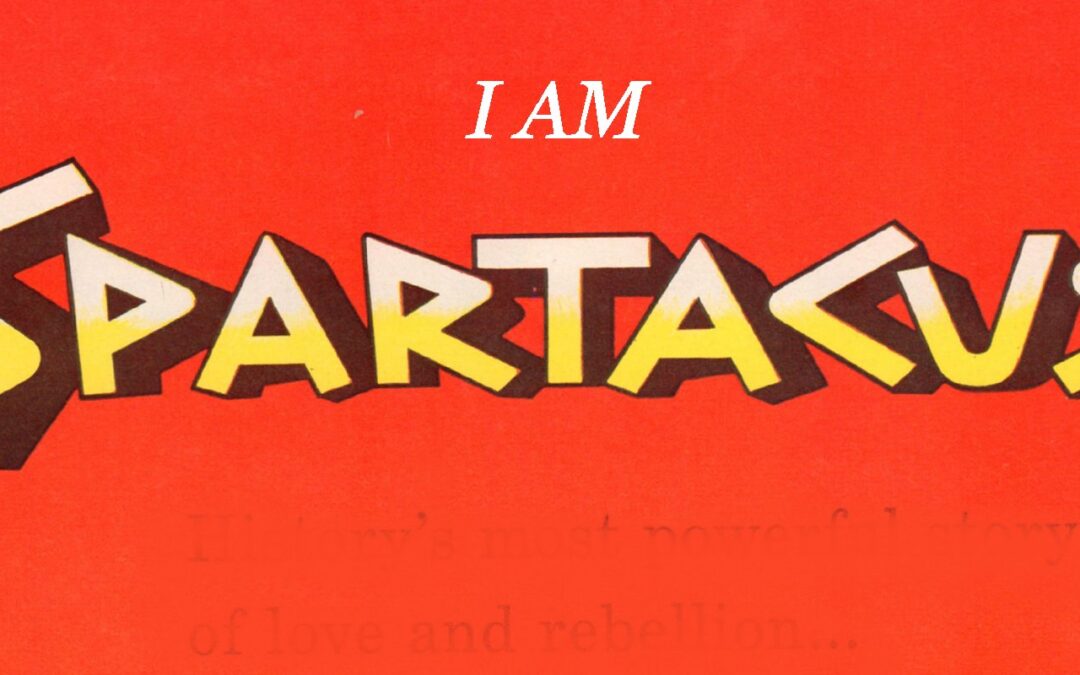In 1960, Stanley Kubrick gave us the classic movie Spartacus (4 Academy Awards). If you haven’t seen the film, it’s the true (mostly) story of a gladiator and slave in Roman times. We don’t have a lot of specifics about Spartacus himself from the historical record, but the events of his life are pretty well documented. The movie fills in many of the blanks (with artistic license) of the Spartacus story culminating in the famous line “I am Spartacus”. Short of completely spoiling it for those who haven’t seen it, Spartacus is the story of an unlikely leader who gave it all for those around him, and they in turn gave their all for him.
It’s a mixture of history, lessons, ideals, and metaphors that we would like to be true. Since we learn best through stories, Spartacus is a great lesson in leadership. What does this have to do with going remote? Nothing and everything. Poor leadership can exist in an office-first environment because there are often informal networks that allow it to survive and be tolerated. Kinks in the armor become much more obvious in a remote or hybrid work environment. Rather than adapt, many leaders are pushing return-to-office mandates that only benefit themselves.
Building a culture of trust and strong leadership is the key to any organization regardless of how it is organized. Let’s return to our regularly scheduled movie Spartacus, starring Kirk Douglas, Tony Curtis, Laurence Olivier, and at least one centurion who forgot to take off his Rolex, for a few leadership lessons.
Vision and Purpose
In the movie, Spartacus leads a revolt with a clear vision of freedom for the enslaved. His unwavering commitment to this purpose inspires others to follow him, even at great personal risk. Spartacus’ leadership is fueled by a strong sense of justice and the desire to liberate others. Leaders must have a clear purpose that resonates with their followers.
As a business leader, chances are you aren’t leading a revolt, but you are most likely introducing something into the market or instituting a change within your organization. The pain and bloodshed are likely to be more metaphorical than physical but still challenging. Without a vision and purpose that your team can get around, you are fighting a losing battle.
Empathy and Care for Followers
Spartacus treats his followers with respect and empathy, understanding their struggles because he shares them. This human connection strengthens their loyalty and commitment. He prioritizes the well-being of his people, ensuring they have the resources and support they need, which fosters a strong, united group.
Leaders often become distanced from the people they work with. This disconnect can have ripple effects across the organization. Leaders actively need to connect with the people they work with if this doesn’t come naturally through the course of business. If you are a leader who believes everyone is replaceable, it’s just a matter of time before someone makes that same determination about you. And don’t just do it to fill the square. People can see that a mile away. If it’s not your strong suit, work with a coach so you can see how you are perceived, and work on developing your style that connects with the people who work for you.
Courage and Resilience
Spartacus exhibits immense courage in the face of overwhelming odds. His resilience in battle and against the Roman Empire’s power is a testament to his strength as a leader. He leads from the front, showing bravery in every challenge, which encourages his followers to be brave as well.
There are plenty of heroes around, but not all of them make the news. Msgt John Chapman might not be a name you know, but he has been the model for several movie and TV characters about Special Forces. John was awarded the Medal of Honor for his sacrifice. He was a year younger than me and grew up a couple of towns over. I don’t think we ever met, but I was connected with his mother and sister through some of the work I do with Gold Star Families. His mom let me use a picture of him for the cover of one of my books. (If you look at it, the reason it looks grainy is because it’s a collage of 10,000 photos of other soldiers who have lost their lives.)
In the business world, Sara Blakely is one of many entrepreneurs who stands out for their courage and resilience. Who would have thought that cutting the legs out of a pair of pantihose would create an empire. And in the sports world, the US Women’s Rugby Team shows courage and resilience like no other team in professional sports.
Inspiration through Action
Spartacus doesn’t just talk about freedom; he takes decisive action to achieve it. His deeds inspire others more than words alone ever could. By embodying the values he stands for, Spartacus becomes a role model for his followers, motivating them to rise to the occasion.
The idea for this article came from watching Ilona Maher who is one of the centers for the Women’s Rugby Team. She has developed a large social media following almost entirely through her message to women athletes, and women in general. Being among the standouts of the Olympics just pushed things over the top. She isn’t just a role model, she is a defining force in shaping the future of rugby. Young girls all over the world have a new figure they want to grow up to be. It doesn’t get much better than that. (Oh and it’s her birthday!)
Strategic Thinking
Spartacus demonstrates strategic thinking by organizing a formidable rebellion and making critical decisions on the battlefield. He shows the ability to adapt his strategies as the situation evolves, which is crucial for any leader facing changing environments.
The last 4 years have been all about adaptability. I’ve seen businesses survive that adapted to the new world of Covid and remote work, and I’ve seen businesses slowly destroy their culture and business because they didn’t adapt. Everything from commuting to communication to supply chain issues changed since 2020. Now add things like AI into the mix and it’s going to change even more, and faster. Leaders who aren’t thinking strategically about embracing the future aren’t going to have one.
Sacrifice and Selflessness
Spartacus is willing to sacrifice his life for the greater good, putting the needs of his followers and their shared goal above his own safety. His willingness to put the collective good before his personal interests is a powerful leadership trait that inspires others to do the same.
Simon Sinek’s book Leaders Eat Last is a good starting point to see these principles in action. The title says it all. You take care of your people first. If you aren’t doing that, people take notice. Ultimately your tenure as a leader is likely to be determined by whether or not people view you as one.
Building Unity and Trust
Spartacus unites a diverse group of people with a common cause. By emphasizing shared values and goals, he builds a strong, cohesive force. His honesty, integrity, and commitment earned him the trust and loyalty of his followers, which are crucial for maintaining morale and cohesion in challenging times.
In business, sports, or life, without trust, nothing else matters. You don’t have to look far in many cases to see a lack of trust in the workplace. Thankfully there is hope. Cristina Herrera & Susan Spiers from Trustworthy may be just what your team needs to bring unity and trust back into your organization.
A Gladiator/Leader for a New Century
We don’t see many people who exhibit power and leadership in a perfect combination. We also don’t see their supporters standing up with something similar to “I am Spartacus” in support of them. While perfect might be a strong word, using this list above, there are a few names that come to mind that check many of the boxes. Tom Brady, John F. Kennedy, Taylor Swift, Martin Luther King, Richard Branson, Nelson Mandela, Oprah Winfrey, Steve Jobs, Sara Blakely, Steven Bartlett, and my newest addition to the list – Ilona Maher, We want leaders who embody all of these characteristics. And we need it for the world we are moving into. Whether it’s work, sports, politics, technology, or pop culture, we want leaders we can get behind and be willing to say our version of “I am Spartacus”. While the analogy may be old, the principles are very much current.
While I’m sure there will be others, I expect big things from Ilona Maher over the next 4 years. She has the compassion of a nurse, the heart of a warrior, and a message for girls and women everywhere. Be the leader you always wish you had, and stand up for the leaders who have your back. You can almost hear the chant now…



